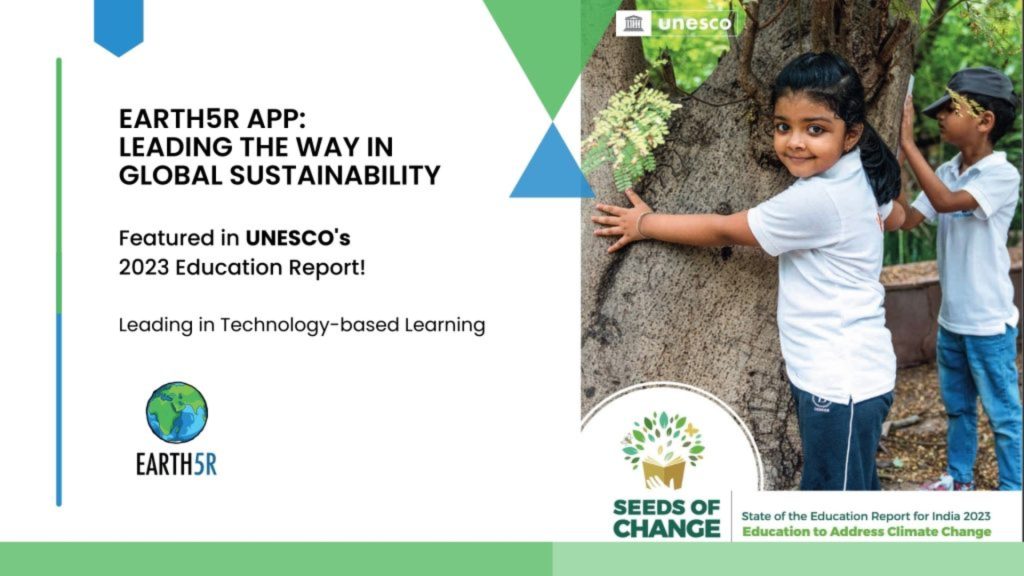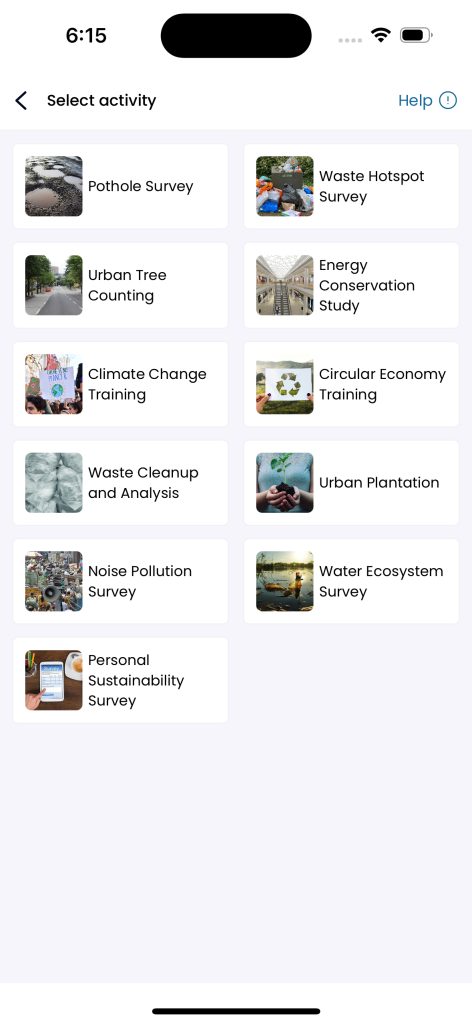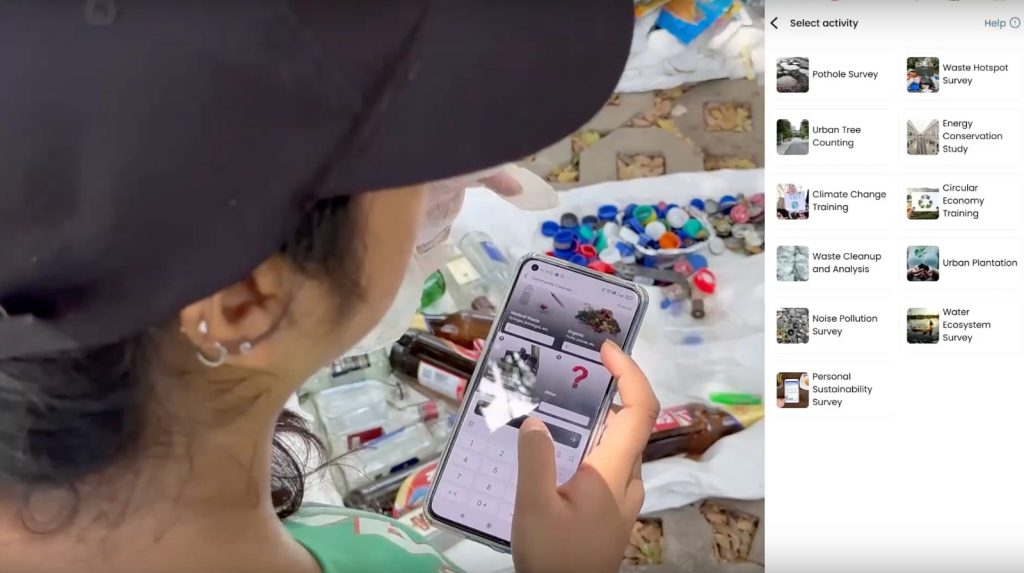In today’s digital age, Earth5R is at the forefront of transforming volunteering and internships in India with its innovative App. This groundbreaking platform empowers individuals to make a tangible difference in their communities and the environment by utilizing various modules designed to address pressing issues.
The app’s modules cover a wide range of environmental and social challenges, including measuring noise pollution, identifying garbage hotspots, assessing tree counts, sampling waste post-cleanup, and monitoring water pollution. Through these activities, volunteers and interns contribute to real-world solutions while honing their skills and fostering leadership qualities.

Every day, hundreds of individuals join the Earth5R community as interns and volunteers, attracted by the app’s user-friendly interface and the opportunity to enact positive change. The automated nature of the platform streamlines the onboarding process, allowing users to select their areas of interest and immediately engage in meaningful actions.
The Earth5R App’s suite of modules provides a multifaceted approach to sustainability and volunteer engagement. Here’s an overview of how each module facilitates impactful activities:
Pothole Survey: Addressing road safety and infrastructure, this module enables citizens to report potholes. The collective data can be used by local authorities for repairs, ultimately contributing to safer and more efficient transportation.
Waste Hotspot Survey: Users identify and report areas with significant waste accumulation. The collected information can lead to targeted clean-up initiatives and improved waste management strategies.
Urban Tree Counting: In this module, volunteers contribute to the assessment of green cover by counting trees in urban areas. This data is vital for urban planning and maintaining ecological balance.
Energy Conservation Study: Participants survey energy usage patterns, promoting awareness and suggesting conservation measures. This can influence policy and encourage sustainable energy practices.
Climate Change Training: Providing education on climate change, this module equips individuals with knowledge to take informed action, creating a ripple effect of environmental consciousness.
Circular Economy Training: Volunteers learn about and contribute to the circular economy, where resources are reused and recycled, reducing waste and fostering sustainable production and consumption.
Waste Cleanup and Analysis: Post-cleanup analysis teaches volunteers about the types and quantities of waste collected, emphasizing the importance of waste segregation and recycling.
Urban Plantation: This initiative encourages urban forestry, improving air quality and urban biodiversity. Volunteers plant and maintain trees, enhancing the urban ecosystem.
Noise Pollution Survey: Users measure noise levels, contributing to a database that can inform noise reduction policies and improve urban living conditions.
Water Ecosystem Survey: Focused on water bodies, volunteers monitor health indicators, advocating for cleaner water and influencing water management policies.
Personal Sustainability Survey: Individuals assess their lifestyle’s sustainability, encouraging personal responsibility and incremental changes towards greener living habits.
By participating in these modules, volunteers not only contribute to immediate environmental action but also gather data that can drive long-term policy changes and societal shifts towards sustainability.
One of the most remarkable aspects of the Earth5R App is its impact measurement system. Each activity is geo-tagged, and users are encouraged to share real-time photographs from the field, providing authentic evidence of their contributions. This not only enhances accountability but also inspires others to take action.

Earth5R App Volunteering Modules
The Earth5R Impact Report for 2023 encapsulates the substantial effects these modules have had on environmental and societal issues:
Noise Pollution: There’s been an impressive reduction in average noise levels from 70 dB to 62 dB in surveyed areas, highlighting the success of the noise pollution surveys in raising awareness and prompting noise reduction initiatives.
Energy Conservation: The energy conservation efforts have led to a significant 18% decrease in energy consumption, showcasing the effectiveness of the energy conservation study module in promoting sustainable energy practices.
Pothole Study: The focused efforts on the pothole survey module have not only decreased road-related accidents by 31% but also contributed to a 15% reduction in vehicular emissions, underlining the dual benefits of improved safety and environmental impact.
Personal Sustainability: The personal sustainability module has inspired change at an individual level, with 27% of participants incorporating at least three new sustainable practices into their daily lives, driving the message of personal responsibility towards sustainability.
Urban Plantation: The plantation of 7,204 saplings, as recorded in the urban plantation module, is not just greening urban areas but also sequestering approximately 360 metric tons of CO2 annually, illustrating the direct impact on climate change mitigation.
Urban Tree Counting: Accurate data collection for 60,706 trees evidences the detailed work and contribution of volunteers in urban tree counting, which is essential for urban planning and environmental preservation.
Climate Change Training: Training over 23,870 individuals, the climate change training module has substantially expanded the community’s understanding and ability to combat climate change through informed action.
Water Ecosystem: Restoration activities in the water ecosystem survey module have revitalized 94 local water bodies, leading to a 27% improvement in water quality, which speaks volumes about the environmental restoration efforts.
Waste Cleanup and Analysis: The removal of 24 metric tons of waste, including 2.4 million pieces of plastic, through the waste cleanup and analysis module, demonstrates the tangible cleanup efforts and their importance in waste management and environmental health.
Waste Hotspot: A 26% reduction in waste accumulation in identified hotspots shows the effectiveness of the waste hotspot survey, directing attention and resources to critical areas for a cleaner and healthier environment.
Environmental volunteering plays a crucial role in youth development, offering invaluable opportunities for skill-building and leadership development. Engaging in such activities during high school or college can greatly enhance one’s resume and prepare them for future academic or career pursuits.
Furthermore, environmental volunteering fosters a sense of civic responsibility and instills a deep appreciation for nature and sustainability. By participating in initiatives like tree plantation drives or waste management campaigns, individuals learn the importance of conservation and become advocates for positive change in their communities.
Earth5R App is revolutionizing the way we approach volunteerism and internships, providing a platform for individuals to make a meaningful impact on the environment while honing their skills and leadership abilities. Through this innovative tool, youth are empowered to become agents of change and contribute to a more sustainable future for all.




